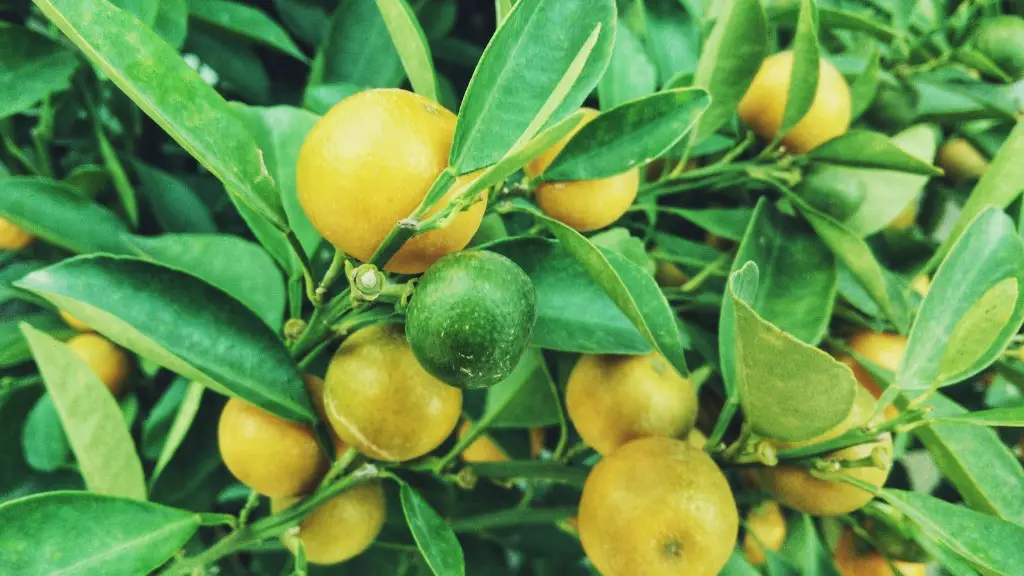Feeding your lemon tree should be done with caution, since over-fertilizing can cause an imbalance in the essential nutrients required for growth. Fertilizers should be used to supplement the placement of fertilizer in the soil, not to replace it. It’s important to recognize that your lemon tree needs specific nutrients at different times throughout the year. With this in mind, when should you feed your lemon tree?
There are two main times when you should start fertilizing your lemon tree. The first is at the beginning of the growing season. During this time, you’ll want to use a fertilizer that is high in nitrogen, such as a 12-4-8 fertilizer or a 10-10-10 fertilizer. This will provide the lemon tree with the nutrients it needs to promote healthy foliage. The second time you should fertilize your lemon tree is at the end of the growing season. During this time, you should use a fertilizer with a higher phosphorus content, such as a 10-20-10 fertilizer or a 20-20-20 fertilizer. This will provide the tree with the nutrients it needs to promote blooming and fruiting.
You should feed your lemon tree regularly throughout the year. The exact amount of fertilizer needed depends on the age and size of your tree, as well as the soil type. For mature trees, you should use about 2 to 3 pounds of fertilizer per year. For younger trees, use about 1 pound of fertilizer per year. If you are not sure how much to use or are unsure of the soil type, make sure to get professional advice from a nursery or arborist.
It’s also important to make sure you water the lemon tree regularly. Lemon trees require water to stay healthy, so make sure to water your tree every week or two. Depending on your climate, you may need to water more frequently. In hotter climates, you may need to water your tree every day. Also, make sure to water the tree deeply, not just a few inches into the soil.
You can also add other nutrients to your lemon tree to promote growth. Compost, manure, and seaweed are all great additions to help your tree grow and thrive. These additions can help your tree produce more lemons and will improve the overall health of the tree. Again, it is important to find the right balance when adding these nutrients, and to get professional guidance when needed.
Finally, make sure that you don’t forget about pruning. Pruning your tree will help to keep it growing in the right direction and encourage better fruit production. Prune your lemon tree in early spring and late summer, removing any dead or diseased branches and shaping it to your desired shape. Make sure to only prune the necessary branches, as over-pruning can cause damage to the tree.
Pruning Your Lemon Tree
Pruning your lemon tree is an integral part of taking care of it and maintaining its growth. Pruning your tree will help to keep it growing in the right direction and encourage better fruit production. Pruning should be done in the early spring, or at the beginning of the growing season, and again in late summer, or at the end of the growing season. The goal is to keep the tree branches growing in the desired direction and to keep the canopy open for good air circulation and light penetration.
When pruning, it is important to pay attention to the size of the tree. If you have a mature tree, it may need more pruning than younger trees. You should begin by examining the tree and removing any dead or diseased branches. Then, shape the tree, if necessary, to the desired shape. Make sure to use precaution when cutting and don’t cut too much, since over-pruning can cause considerable damage to the tree.
To ensure your pruning is done right, it is highly recommended to get the help of an experienced arborist. An arborist will be able to assess the health of your tree and recommend the appropriate pruning for your specific tree and climate. They can also trim and shape your tree into the desired shape or design.
Finally, it is important to note that pruning can help to maintain the health of your lemon tree. After pruning, make sure to apply fertilizer to maintain the tree’s nutrient levels, as this will help it grow strong and healthy. Lemon trees are beautiful and require a certain amount of care to ensure they stay healthy and produce the most lemons.
Fertilizers For Your Lemon Tree
Fertilizing your lemon tree is essential in order to ensure it stays healthy and produces a bountiful harvest. The type of fertilizer used is important, as it will provide the necessary nutrients your tree needs to stay healthy and thrive. When it comes to fertilizers, you should use one that is high in nitrogen, such as a 12-4-8 fertilizer or a 10-10-10 fertilizer at the beginning of the growing season. Then, at the end of the growing season, switch to a fertilizer that has a higher phosphorous content, such as a 10-20-10 fertilizer or a 20-20-20 fertilizer.
When it comes to calculating how much fertilizer to use, it is important to know the age and size of your lemon tree. An adult lemon tree requires about 2-3 lbs. of fertilizer per year, while a younger tree only requires about 1 lb. per year. If you are not sure how much to use or are unsure of your soil type, it is best to consult a nursery or arborist.
It is also important to make sure the fertilizer is properly spread over the soil. Bulky soils require more fertilizer to achieve the desired results, while sandy soils require less. It is also important to keep in mind that over-fertilizing can be harmful to your lemon tree. Lemon trees need specific amounts of essential nutrients to stay healthy and over-fertilizing can create an imbalance in these nutrients.
Finally, it is important to note that organic fertilizers are an excellent choice when it comes to keeping your lemon tree healthy. Organic fertilizers provide a slow release of nutrients over an extended period of time and are much safer than synthetic fertilizers. Additionally, organic fertilizers contain beneficial microorganisms that help develop healthy soil and boost the nutrient content of the soil.
Watering Your Lemon Tree
Watering your lemon tree is very important for its health and growth. Lemon trees need regular, deep watering to stay healthy and ensure optimal production. Depending on the climate, the frequency of watering will vary. In a hotter climate, your lemon tree may need to be watered every day, while a cooler climate may only require weekly or bi-weekly watering.
When watering your lemon tree, it is important to make sure you go deep. Most of the lemon tree’s root system is located 6-12 inches below the surface, so make sure to get the water down to that level. Watering the top layer of the soil is not enough. Additionally, make sure to evenly distribute the water so it reaches all areas of the root system. Using a garden hose or drip system is the best way to ensure even water distribution.
It is also important to make sure you are not over-watering your tree. If you notice the leaves of your lemon tree turning yellow or falling off, this may be a sign of over-watering. Additionally, if you start to see white or gray powdery deposits on the leaves or branches, this could also be a sign of over-watering. In either case, be sure to check the soil and make sure it is not too saturated.
Finally, while watering your lemon tree is important, it is also important to make sure you are not giving it too much water. To do this, it is best to check the soil regularly and make sure it is not too dry. If the soil feels dry to the touch, it is time to water your lemon tree. Keep in mind that if your climate is hot and dry, your lemon tree may require more regular watering.
Adding Nutrients To Your Lemon Tree
Adding extra nutrients to your lemon tree can be a great way to promote healthy growth and a bountiful harvest. Compost, manure and seaweed are all examples of excellent additions to your lemon tree. Compost is a great option for adding soil nutrients and microorganisms. Manure is high in nitrogen, phosphorous and other essential nutrients. Seaweed is another great addition, as it contains many valuable micronutrients that can greatly improve the health and productivity of your lemon tree.
When adding these nutrients to your lemon tree, it is important to find the right balance. Too much can be detrimental to your tree and should be avoided. Additionally, it is best to get professional guidance when adding any extra nutrients. A nursery or arborist can assess your soil condition and recommend the most effective and safe additions.
Finally, it is important to remember that while these nutrients can be beneficial, they are not essential. Your lemon tree will be able to survive and produce fruit without them, but their addition will greatly help your tree grow healthy and strong. If you choose to add these extra nutrients, make sure to do your research and follow the guidelines for proper application and usage.




